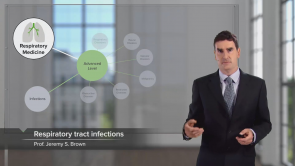Streptococcus Pneumoniae

Über den Vortrag
Der Vortrag „Streptococcus Pneumoniae“ von Vincent Racaniello, PhD ist Bestandteil des Kurses „Pediatric Infectious Diseases - Additional Lectures (Rush PA - Pediatrics I)“.
Quiz zum Vortrag
Which of the following is TRUE about pneumococcal vaccines?
- The pneumococcal polysaccharide vaccine should be administered to adults previously unimmunized for S. pneumoniae.
- There is one vaccine that can be given to all age groups to protect them from pneumococcal pneumonia.
- There are more than four types of vaccines against streptococcal pneumonia available throughout the world.
- The vaccines available today protect against all known strains of S. pneumoniae.
- A child inoculated with a pneumococcal vaccine will need to receive a booster as an adult to remain protected.
Which of the following is the bacterial pathogen most commonly found in cases of community-acquired pneumonia?
- Streptococcus pneumoniae
- Group A streptococci
- Group B streptococci
- Staphylococcus aureus
- Staphylococcus epidermidis
Which of the following pathological features caused by smoking puts smokers at increased risk for pneumococcal lung infections?
- Decreased ciliary elevator activity
- Increased respiratory secretions
- Decreased phagocyte activation
- Increased incidence of colonization
- Decreased CRP
Diese Kurse könnten Sie interessieren
Kundenrezensionen
2,0 von 5 Sternen
| 5 Sterne |
|
0 |
| 4 Sterne |
|
0 |
| 3 Sterne |
|
0 |
| 2 Sterne |
|
1 |
| 1 Stern |
|
0 |
Faltan aspectos microbiologicos como factores de virulencia y patogenia, pruebas de laboratorio, y enfermedades que produce.









